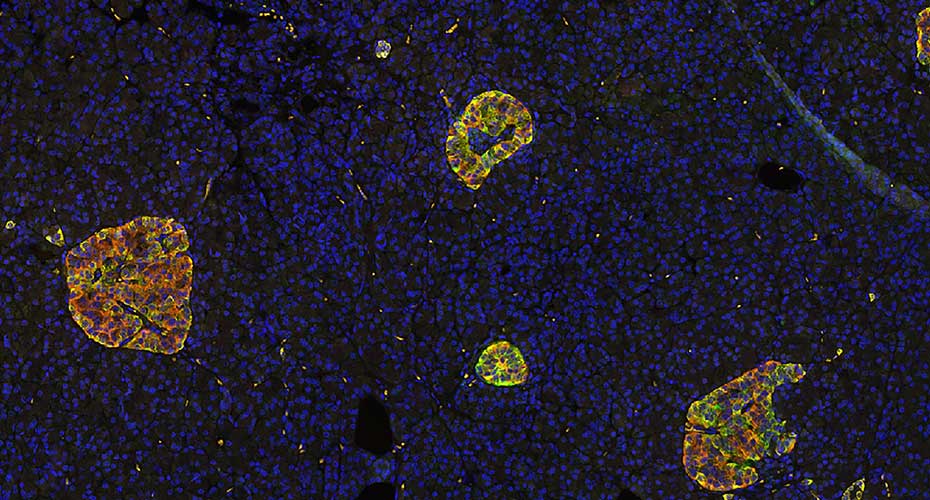Precision diabetes: The right treatment for each patient
21 January 2021
4 mins to read
Diabetes affects more than 460 million people worldwide – nearly ten per cent of the global population – and the number is increasing daily. Getting the right diagnosis and treatment is fundamental to ensuring each person has optimal blood sugar control and avoids complications including heart attacks, strokes, kidney failure and blindness.
The University of Exeter has led the way in making discoveries that are swiftly translated into healthcare, to improve lives worldwide. Our unique precision diabetes approach focuses on getting the right treatment for each patient, as swiftly as possible. Exeter has discovered 21 different genetic types of diabetes and optimised treatment for all diabetes types. Making the right diagnosis is the first step to the best treatment and the team has excelled in developing diagnostic tools for clinicians throughout the world.

"Precision diabetes is about matching treatment to the individual patient," explained Andrew Hattersley FRS, Professor of Molecular Medicine at the University of Exeter Medical School. "Diabetes is complex, and consists of many different sub types not just type 1 or type 2. Failing to diagnose subtypes means a lot of people aren’t getting the right treatment. Our precision diabetes work has broken this down. As a result, we now understand much more about the cause of a person’s diabetes, and how they’re going to respond to treatment. We package that information in a way that can be used by clinicians to directly benefit patients."
"Diabetes is complex, and consists of many different sub types not just type 1 or type 2. Failing to diagnose subtypes means a lot of people aren’t getting the right treatment. Our precision diabetes work has broken this down. As a result, we now understand much more about the cause of a person’s diabetes, and how they’re going to respond to treatment. We package that information in a way that can be used by clinicians to directly benefit patients."
Professor Andrew Hattersley FRS
Professor of Molecular Medicine,
Consultant Physician



How a diabetes revolution began
The Exeter diabetes lab was formed in 1995, by founders Professor Sian Ellard, expert in the then-emerging field of genetics, Professor Andrew Hattersley, a diabetes consultant, and Professor Maggie Shepherd a diabetes nurse. Their skills formed the embryo of Exeter’s precision diabetes focus, working on discovering genes, defining optimal clinical care and educating clinicians. They swiftly embedding best practice in the NHS to get the right treatment for patients.
"We really wanted to make a difference,” said Professor Hattersley “Our lab started from scratch – that means we could really focus on complete integration of research with the NHS diagnostic service. Our discoveries swiftly translate into providing better care. Wherever you are in the world, if you have a genetic form of diabetes, Exeter research will have guided your diagnosis and treatment."

The importance of true interdisciplinarity
Exeter fosters an incredibly wide range of academics working together, to find real-world solutions to improving diabetes diagnosis, treatment and care.
Professor Maggie Shepherd said: "Within the Exeter team, there’s a whole range of people bringing their skills to finding new ways to improve treatment. We bring together scientists, medics, statisticians, biochemists and myself as a nurse, all with a real passion for making a difference. We complement each other and that incredibly strong relationship between clinicians, researchers and patients is so important. It’s crucial to all of us that our research makes a difference to patients."
The team takes particular pride in supporting young talent, with rapid progression pathways. Professor Richard Oram, a Diabetes UK Harry Keen Research Fellow, said: "There’s a thread of kindness that runs throughout the whole team that makes working at Exeter really special. The collaboration and support is absolutely incredible, and helps junior members of the team become leaders in their own right."
Diabetes consultant Professor Angus Jones said; "One of the wonderful things about working at Exeter is the fantastic impact on my own practice. When I see people with diabetes in my clinic, I’m using evidence and tools from my own team at Exeter. That’s incredibly satisfying."
"Within the Exeter team, there’s a whole range of people bringing their skills to finding new ways to improve treatment. We bring together scientists, medics, statisticians, biochemists and myself as a nurse, all with a real passion for making a difference. We complement each other and that incredibly strong relationship between clinicians, researchers and patients is so important. It’s crucial to all of us that our research makes a difference to patients."
Professor Maggie Shepherd
Honorary Clinical Professor,
Lead Research Nurse
Meet our researchers
Explore more research

From gene discovery to revolutionising clinical care
When the Exeter diabetes lab was set up in 1995, medicine did not recognise that many forms of diabetes are caused by a single gene mutation.

Unravelling the mysteries of the pancreas to improve type 1 diabetes diagnosis
Exeter have busted diagnosis myths and created new, simple and inexpensive diagnostic tests that are being used around the world.

Understanding type 2 diabetes, to treat all its forms
By far the most common form of diabetes, type 2 diabetes is nevertheless misunderstood. While classified as one condition, the complex disease actually comes in all shapes and sizes.





